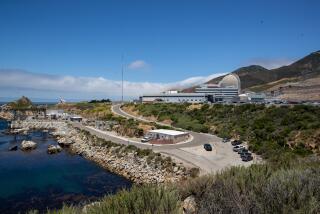Worker Who Failed Drug Test Barred at San Onofre
- Share via
For the first time in the 21-year history of the San Onofre nuclear power plant, the Nuclear Regulatory Commission has suspended the license of a reactor operator for failing a drug test.
Maurice P. Acosta Jr. had his license lifted Thursday by the federal agency after he failed for the third time a drug test administered by Southern California Edison, which operates the plant.
Marijuana Detected
Acosta had been suspended by the utility since the May 28 test, which was positive for the presence of marijuana, according to an Edison spokesman, David Barron.
He said Acosta was taking part in a routine retraining program last month and was not actively involved in daily operations at the time of the test that resulted in his suspension. “There was no safety hazard,” Barron stressed.
Acosta, a seven-year employee, had tested positive for drugs twice before. Under an annual testing program for reactor operators, Acosta failed urinalysis screening March 6, 1986, and again May 12, 1986. As a result, he was being monitored by the company and being tested on a random basis, Barron said. In the intervening two years, Acosta successfully passed 11 drug tests, Barron said, adding that Acosta is undergoing mandatory rehabilitation in an in-patient program at company expense.
Acosta’s current license was set to expire July 1, and he had already applied for a renewal, according to commission spokesman Greg Cook, who added that the agency not only suspended the current license but also denied Acosta’s renewal application. Acosta may re-apply for another license, Cook said, “But that doesn’t necessarily mean we’re going to give him one.”
Licensing Is Required
The agency requires the plant’s 100 operators who have direct access to the controls of nuclear equipment to be licensed.
“We need reasonable assurance that the public safety is protected before we issue a license,” Cook said. “There is no indication Acosta had used drugs on the work site or that he ever showed up for work under the influence.”
But, Cook said, the agency did not feel it had the necessary assurance that Acosta could carry out his duties with sufficient alertness and ability.
Barron said no San Onofre worker had ever had a license suspended by the NRC before but there had been occasions when reactor operators failed the company-instituted drug tests. On those occasions, however, the workers voluntarily entered drug programs and did not lose their licenses, he said. There are 2,500 employees.
Barron explained that Acosta’s first two drug-test failures in 1986 occurred while an old policy was in effect. At that time, an employee had to fail three drug tests before being suspended from work, he said.
Southern California Edison has since established tighter rules. A worker’s first failure will result in revocation of his access badge. Access to the plant is not reinstated until the worker has passed another drug test and undergone a dependency evaluation. Under the new rules, a second positive test will cause an automatic 30-day suspension, Barron said.
More to Read
Sign up for Essential California
The most important California stories and recommendations in your inbox every morning.
You may occasionally receive promotional content from the Los Angeles Times.













